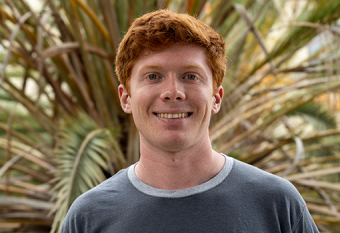
UC Santa Barbara chemical engineering faculty members have awarded the department’s top honor for a rising third-year PhD student, the prestigious Dow Discovery Fellowship, to Ryan Berry. The department bestows the fellowship each year upon one student who has made outstanding strides in research and presents a compelling plan for an innovative project. Made possible by a generous contribution from the Dow Chemical Company, the three-year, $150,000 fellowship is designed to support students over the remaining three years of their graduate work.
“Being selected for the Dow Discovery Fellowship is an incredible honor and reaffirms my commitment and passion for pursuing impactful and leading-edge research,” said Berry, who received his bachelor’s degree in chemical engineering from Lafayette College. “Academically, this fellowship gives me the freedom to explore more high-risk and high-reward projects.”
Berry is co-advised by chemical engineering professor Phillip Christopher and Michael Gordon, professor and chair of the Chemical Engineering Department. Berry works in the field of catalysis, an indispensable process that requires energy, often in the form of heat, to activate the requisite chemical reaction. The chemical industry relies on catalysts for over ninety percent of its processes. In the past several years, there has been a significant push to develop novel catalytic materials and processes that are more efficient and environmentally friendly. Berry specializes in photocatalysis, a process where the absorption of light drives specific catalytic reactions. He uses pulsed visible light to study and manipulate reactions occurring on heterogeneous catalysts, which are substances whose physical phase is different from the phase of the reactants and/or products that participate in the chemical reaction. The synthesis of ammonia, a key component in fertilizer, relies on heterogeneous catalysis.
“By tuning the light’s pulsing frequency to match the timescales of key steps in the reaction, I am seeking to measure and manipulate these processes,” explained Berry. “This approach will not only provide deeper insight into reaction mechanisms but also offers the potential to control the reactions, potentially enhancing selectivity or reactivity.”
The fellowship will allow Berry to construct a high-throughput experimental technique to measure catalytic systems and design a novel spectroscopic technique to observe surface-bound molecules with high resolution. Berry says that improving catalytic efficiency could have significant implications for industries, such as energy production and chemical manufacturing, which rely heavily on heterogeneous catalysis.
“Assigning rates to elementary reaction steps has long been a major challenge in chemical engineering and chemistry,” said Berry. “I am most excited to see if my research has the potential to provide deeper insight into reaction mechanisms on industrially relevant heterogeneous catalysts.”
Berry’s co-advisors describe him as extremely hardworking and knowledgeable about many topics. They are looking forward to seeing the results from his high-risk, high-reward project which could help power more efficient light-driven catalytic processes.
“Ryan is simultaneously an excellent engineer and scientist with the ability to design and construct complex equipment aimed at performing experiments that address fundamental questions about how catalysts function,” said Christopher, Berry’s co-advisor and the Mellichamp Chair in Sustainable Manufacturing. “I am excited to see how he puts these skills to work in the analysis and control of fast time-scale chemical processes occurring during catalytic reactions.”



